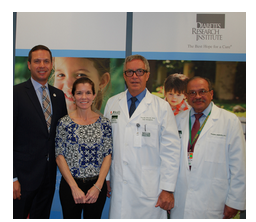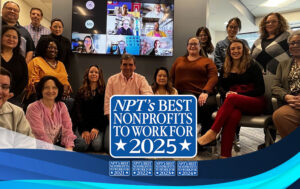Sarah Ford | September 9, 2015
Diabetes Research Institute’s First Patient in BioHub Trial No Longer Needs Insulin
MIAMI, FL – September 9, 2015 – The Diabetes Research Institute (DRI), a Center of Excellence at the University of Miami Miller School of Medicine, announced today that the first patient in its clinical trial has been free from insulin injections in record time following the implantation of islet cells within a biological scaffold. The patient, Wendy Peacock, 43, from San Antonio, TX, underwent the minimally invasive procedure on August 18, 2015, and is now producing her own insulin naturally for the first time since being diagnosed with type 1 diabetes at age 17. In this pilot study, DRI researchers are testing a new transplant technique for insulin-producing cells, building upon decades of progress in clinical islet transplantation. This trial is an important first step toward the development of the DRI BioHub, a bioengineered mini-organ that mimics the native pancreas to restore natural insulin production in people with type 1 diabetes.
“The first subject in our Phase I/II pilot BioHub trial is now completely off insulin with an excellent glucose profile. These are the best post-transplant results we’ve seen in an islet recipient,” said Camillo Ricordi, MD, director of the DRI and the Stacy Joy Goodman Professor of Surgery, Distinguished Professor of Medicine, Professor of Biomedical Engineering, Microbiology and Immunology at the University of Miami Miller School. Dr. Ricordi also serves as director of the DRI’s Cell Transplant Center. “This was the first tissue engineered islet transplant using a ‘biodegradable scaffold’ implanted on the surface of the omentum. The technique has been designed to minimize the inflammatory reaction that is normally observed when islets are implanted in the liver or in other sites with immediate contact to the blood. If these results can be confirmed, this can be the beginning of a new era in islet transplantation. Our ultimate goal is to include additional technologies to prevent the need for life-long anti-rejection therapy,” Dr. Ricordi added.

Get Resources and Insights Straight To Your Inbox
Explore More Articles
Make the Holidays More Meaningful: Engage Your Team with Employee Giving Technology
The holiday season is a time for connection, gratitude, and giving back. For employers, it’s also an ideal moment to strengthen workplace culture, deepen employee…
Read ArticleLaunch a Turnkey Holiday Giving Campaign
Sign up by October 3, 2025 to launch your employee donation site in time for the holidays! Give employees a simple, meaningful way to make…
Read ArticleData Processor & Customer Service Representative, Charitable Funds Management Solutions
Reporting Structure: Director, CFMS Term: October 2025 to February 2026 Schedule: Full-Time; Monday-Friday up to 37.5 hours per week. Rate: $20 per hour Overview of…
Read ArticleGet Resources and Insights Straight To Your Inbox
Receive our monthly/bi-monthly newsletter filled with information about causes, nonprofit impact, and topics important for corporate social responsibility and employee engagement professionals, including disaster response, workplace giving, matching gifts, employee assistance funds, volunteering, scholarship award program management, grantmaking, and other philanthropic initiatives.




